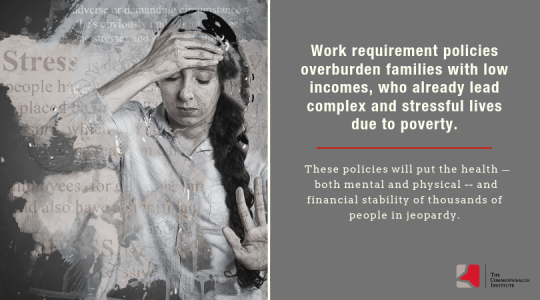June 4, 2019
Behavioral Science Finds Work Requirements Don’t Work As a Method for Reducing Poverty
While work requirements are often touted as a means to promote self-sufficiency and reduce poverty, the evidence continues to pile up: work requirements simply don’t work as a method for reducing poverty. And imposing work reporting requirements on those who receive medical, food, and income assistance through programs such as TANF, SNAP, and Medicaid has a negative impact on the mental well-being of affected individuals and runs contrary to behavioral science research on building programs to escape poverty, according to a report released earlier this year. As Virginia awaits permission to take health coverage away from Medicaid enrollees who do not report a certain number of hours worked on a monthly basis, lawmakers should consider the growing body of evidence that shows these requirements are ineffective and harmful.
Work requirement policies overburden families with low incomes – who already lead complex and stressful lives due to poverty. When people have to manage emergencies on a regular basis – such as making difficult financial decisions regarding basic essentials or deciding whether to miss a day’s wage in order to care for a sick child – it becomes harder to sustain that level of mental effort. This could result in a loss of focus on things that are important but less immediately urgent. We all only have so much “mental bandwidth,” and adding burdensome work reporting requirements could lead to working adults losing coverage by putting additional demands on people’s attentions, according to the report by ideas42. The majority of people who get health coverage through Medicaid are employed, and many are caring for children and/or aging parents. An additional demand, however small, can be the tipping point at which critical information or tasks are missed.
This research comes on the heels of reports of considerable coverage loss for those subject to the rules in Arkansas and shows that becoming aware of the work requirements is the first obstacle in reporting hours. Many Arkansans who lost coverage were already working or were eligible for exemptions but were either unaware or not fully informed about the new reporting rules, according to the report. For those who are working and dealing with a chronic disease, the loss of coverage could lead to loss of employment due to not being healthy enough to complete work tasks. This was the case of Adrian McGonigal, who was featured in a PBS NewsHour segment. Loss of income leads to impossibly difficult decisions surrounding basic needs and health, scenarios Medicaid should be looking to alleviate, not exacerbate.
Taking health coverage away from people who fail to meet work requirements ignores evidence that these policies make it more difficult for people to find and maintain employment. A behavioral science-informed approach to reducing poverty would make it easier – not harder – to access and use benefits. This could be achieved by creating job supports that are widely and easily accessible to a population living with many competing demands without the threat of losing coverage.
Work requirements also promote harmful narratives that disempower families by sending the message that some people in poverty are in need of policing. This is, in part, because such policies shift the focus of case workers and eligibility workers away from connecting families and individuals to resources that will help them to support themselves such as job skills training, instead focusing on strict compliance and completion of paperwork. These narratives are further complicated by other cultural narratives, specifically racism and sexism. And all of these factors combined can have a negative affect on how enrollees are treated by and interact with program staff. Alternatively, a behavioral science-informed program can empower and support families during hard times by providing well-funded supports without the risk of losing crucial health coverage if they happen to lose work hours at a seasonal job, for instance. This can be achieved by positioning program staff as a support and ally instead of a punitive figure, which cannot be accomplished if work requirements are part of the policy.

In the midst of ongoing setbacks for the implementation of work requirements in court, with a federal judge halting work requirements in both Arkansas and Kentucky, Virginia is currently awaiting approval from the federal government to implement work and cost requirements which will likely result in more than 32,000 people losing health care coverage. The behavioral health research and findings from other states makes clear that this is a misguided solution to reducing poverty. State leaders should reject the imposition of work requirements on people in Virginia’s Medicaid program, which will put the health – both mental and physical – and financial stability of thousands of people in jeopardy.
Category:
Health Care
